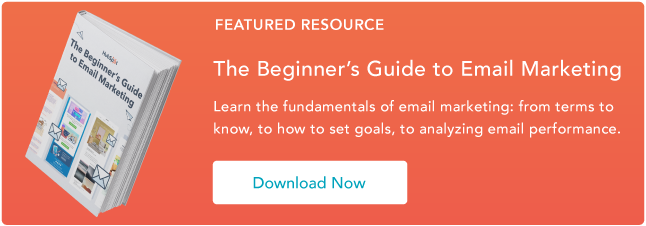Nowadays, marketers put a lot of emphasis on chatbots, Instagram influencers, and other new opportunities to reach their customers.
But your contemporary communication methods shouldn't distract you from one of the oldest and yet most effective messaging channels -- email.
You might be wondering if email is still a worthwhile marketing strategy. In fact, email generates $38 for every $1 spent, which is an astounding 3,800% ROI, making it one of the most effective options available.
If you're still hesitant, keep reading -- we've cultivated a list of email marketing statistics for 2019 to demonstrate just how powerful email can be.

Email marketing stats
- 93% of B2B marketers use email to distribute content.
- Active email accounts are expected to hit 5.6 billion by 2019.
- 83 percent of B2B companies use e-newsletters as part of their content marketing program.
- 40 percent of B2B marketers say email newsletters are most critical to their content marketing success.
- It's estimated that the U.S. will spend over 350 million dollars on email advertising in 2019.
- Mobile opens accounted for 46 percent of all email opens.
- 35% of business professionals check email on a mobile device.
- Apple iPhone is the most popular mobile client for reading emails with 29 percent of all opens occurring on this platform. Gmail is a close runner-up at 27 percent.
- 73 percent of millennials prefer communications from businesses to come via email.
- More than 50 percent of U.S. respondents check their personal email account more than 10 times a day, and it is by far their preferred way to receive updates from brands.
- 99% of consumers check their email every day.
- 80% of business professionals believe that email marketing increases customer retention.
- 59% of respondents say marketing emails influence their purchase decisions.
- The most opened emails relate to hobbies, with an open rate of 27.35 percent.
- >59% of marketers say email is their biggest source of ROI.
- 56% of brands using an emoji in their email subject line had a higher open rate than those that did not.
- Marketers who use segmented campaigns note as much as a 760% increase in revenue.
B2B Email Marketing Statistics
1. 93% of B2B marketers use email to distribute content. (Content Marketing Institute, 2017)
2. Active email accounts are expected to hit 5.6 billion by 2019. (Statista, 2018)
3. 83 percent of B2B companies use enewsletters as part of their content marketing program. (Imaginepub.com, 2017)
4. 40 percent of B2B marketers say email newsletters are most critical to their content marketing success. (Content Marketing Institute, 2017)
5. It's estimated that the U.S. will spend over 350 million dollars on email advertising in 2019. (Statista, 2019)
Mobile Email Marketing Statistics
6. Mobile opens accounted for 46 percent of all email opens. (Litmus.com, 2018)
7. 35% of business professionals check email on a mobile device. (Convince & Convert, 2018)
8. Apple iPhone is the most popular mobile client for reading emails with 29 percent of all opens occurring on this platform. Gmail is a close runner-up at 27 percent (Campaign Monitor, 2018)
Demographic Email Marketing Statistics
9. 73 percent of millennials prefer communications from businesses to come via email. (Adestra, 2016)
10. More than 50 percent of U.S. respondents check their personal email account more than 10 times a day, and it is by far their preferred way to receive updates from brands (Campaign Monitor, 2017).
11. 99% of consumers check their email every day. (DMA Insights, 2017)
B2C Email Marketing Statistics
12. 80% of business professionals believe that email marketing increases customer retention. (Emarsys, 2018)
13. 59% of respondents say marketing emails influence their purchase decisions. (SaleCycle, 2018)
14. The most opened emails relate to hobbies, with an open rate of 27.35 percent. (MailChimp, 2018)
15. 59% of marketers say email is their biggest source of ROI. (Emma, 2018)
Email Marketing Best Practices Statistics
16. 56% of brands using an emoji in their email subject line had a higher open rate than those that did not. (Forbes, 2017)
17. Marketers who use segmented campaigns note as much as a 760% increase in revenue. (Campaign Monitor, 2019)

No comments:
Post a Comment